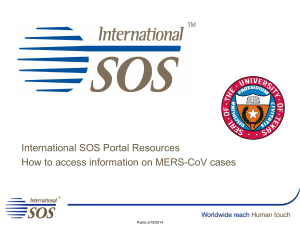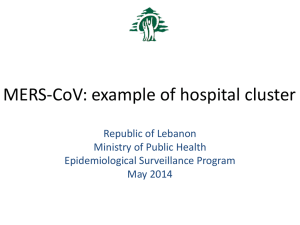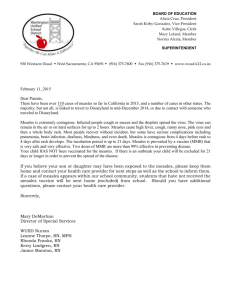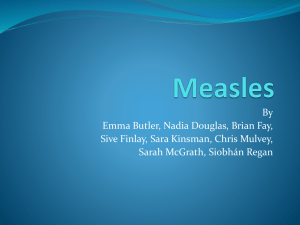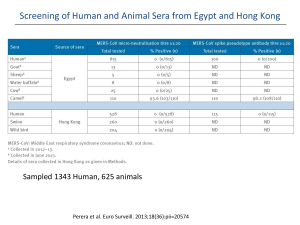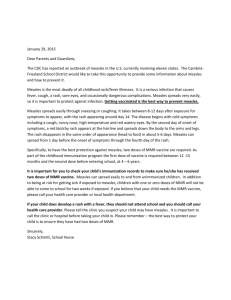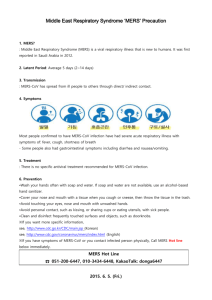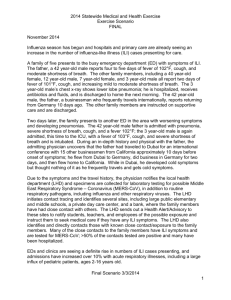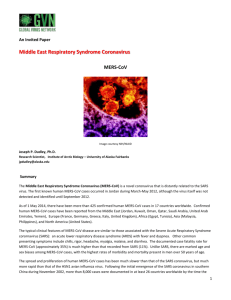Measles or MERS-CoV
advertisement
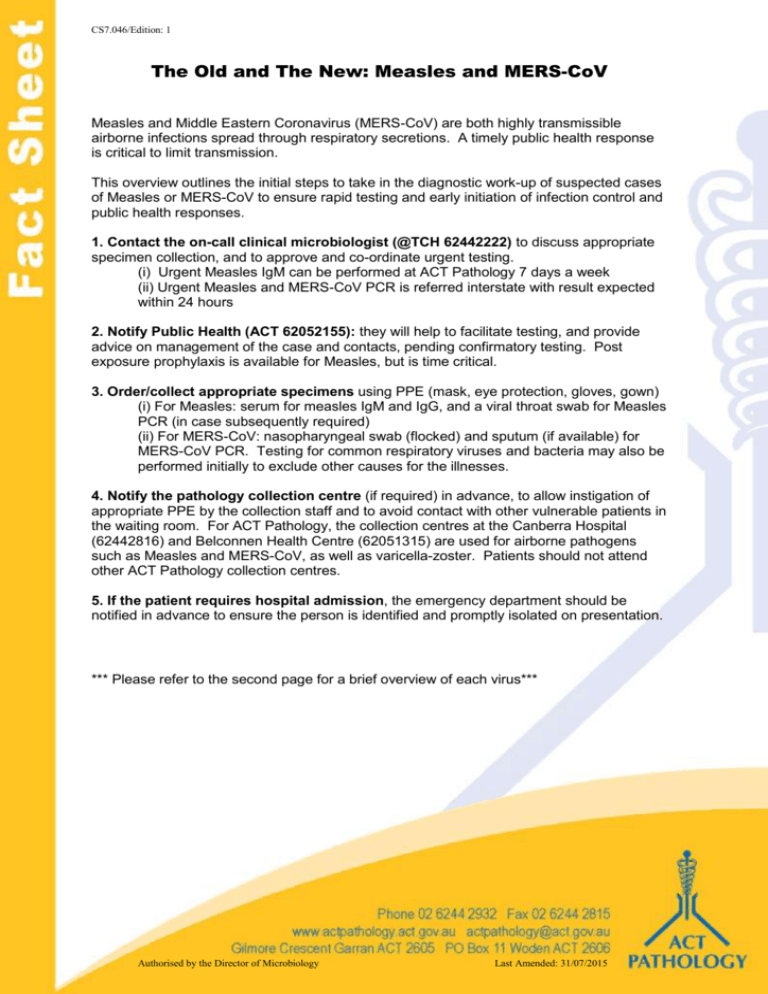
CS7.046/Edition: 1 The Old and The New: Measles and MERS-CoV Measles and Middle Eastern Coronavirus (MERS-CoV) are both highly transmissible airborne infections spread through respiratory secretions. A timely public health response is critical to limit transmission. This overview outlines the initial steps to take in the diagnostic work-up of suspected cases of Measles or MERS-CoV to ensure rapid testing and early initiation of infection control and public health responses. 1. Contact the on-call clinical microbiologist (@TCH 62442222) to discuss appropriate specimen collection, and to approve and co-ordinate urgent testing. (i) Urgent Measles IgM can be performed at ACT Pathology 7 days a week (ii) Urgent Measles and MERS-CoV PCR is referred interstate with result expected within 24 hours 2. Notify Public Health (ACT 62052155): they will help to facilitate testing, and provide advice on management of the case and contacts, pending confirmatory testing. Post exposure prophylaxis is available for Measles, but is time critical. 3. Order/collect appropriate specimens using PPE (mask, eye protection, gloves, gown) (i) For Measles: serum for measles IgM and IgG, and a viral throat swab for Measles PCR (in case subsequently required) (ii) For MERS-CoV: nasopharyngeal swab (flocked) and sputum (if available) for MERS-CoV PCR. Testing for common respiratory viruses and bacteria may also be performed initially to exclude other causes for the illnesses. 4. Notify the pathology collection centre (if required) in advance, to allow instigation of appropriate PPE by the collection staff and to avoid contact with other vulnerable patients in the waiting room. For ACT Pathology, the collection centres at the Canberra Hospital (62442816) and Belconnen Health Centre (62051315) are used for airborne pathogens such as Measles and MERS-CoV, as well as varicella-zoster. Patients should not attend other ACT Pathology collection centres. 5. If the patient requires hospital admission, the emergency department should be notified in advance to ensure the person is identified and promptly isolated on presentation. *** Please refer to the second page for a brief overview of each virus*** Authorised by the Director of Microbiology Last Amended: 31/07/2015 CS7.046/Edition: 1 Measles Measles is uncommon in Australia due to vaccination and subsequent herd immunity. However, in a non-immune population one case of measles can expect to result in 18 further cases. Most cases of measles in Australia occur in non-immune individuals either returning from a measles endemic country or as a secondary case following exposure to a known case in Australia. The incubation period is 10-14 days following exposure. Measles should therefore be highly suspected in non-vaccinated individuals with a compatible clinical presentation (coryza, cough, fever, conjunctivitis, rash) and a travel or exposure history. Acute infection is typically supported by the presence of measles IgM in serum and can be confirmed by demonstration of measles IgG seroconversion on convalescent serum and/or detection of measles RNA by molecular methods (PCR). Infection can occasionally occur in vaccinated individuals, particularly if they have only received one vaccination or are immunosuppressed. Interpretation of serology in these cases can be more difficult. Infection can be prevented in exposed non-immune individuals using measles immunoglobulin, however this MUST be given within 3 days of exposure to be effective. MERS-CoV MERS-Cov has been circulating in humans in the Middle East for almost three years. It is associated with camel contact, however transmission within healthcare facilities is a feature. The case fatality rate is 36%. There have been numerous cases outside of the Middle East in travelers. The largest outbreak outside the Middle East has occurred in South Korea, with 186 people infected from the incident traveler case and more than 16,000 contacts quarantined. This was primarily related to delays in identification of suspected cases resulting in inadequate use of personal protective equipment within healthcare facilities. MERS-CoV should be suspected and testing facilitated when there is: clinical and/or radiological evidence of pneumonia/pneumonitis AND a history of travel (>24hours duration) to the Middle East within the past 14 days OR contact with a case with MERS-CoV within the past 14 days Travel to South Korea is not a significant risk unless the person has had a known exposure to a MERS-CoV case or has attended a healthcare facility with MERS-CoV cases. MERS-CoV is confirmed by the detection of MERS-CoV RNA (PCR) in respiratory tract specimens. Karina Kennedy FRACP FRCPA MPHTM MBBS Ag/Dir Microbiology ACT Pathology Karina.kennedy@act.gov.au 62442105 Authorised by the Director of Microbiology Last Amended: 31/07/2015
